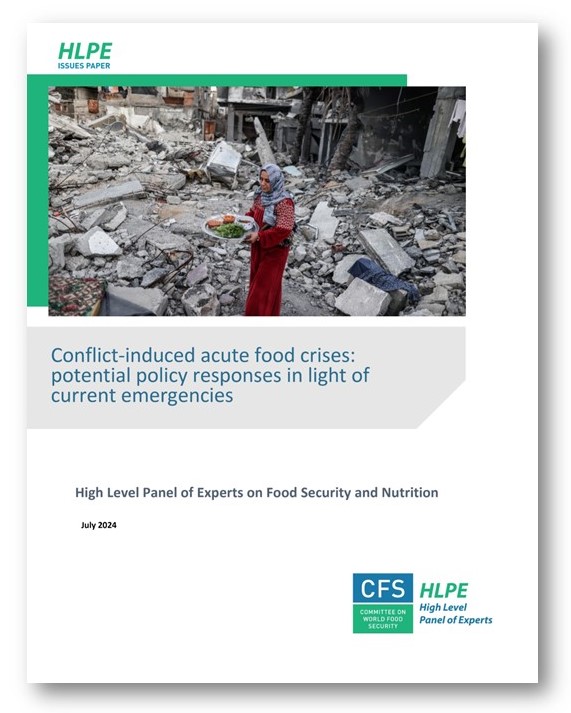New Issues paper of the High Level Panel of Experts on Food Security and Nutrition (HLPE-FSN)

12 March 2024, Gaza. Woman having an Iftar meal during Ramadan on the rubbles of her family’s destroyed home.
©WFP/Ali Jadallah
Today, we face the tragic consequences of multiple conflict-induced starvation and acute food insecurity crises. Almost 282 million people in 59 countries experience high levels of acute food insecurity that threaten their lives and livelihoods, thus requiring emergency action as a matter of life and death. These crises are due to interlinked and superimposed structural vulnerabilities such as state fragility and pre-existing tensions often associated with conflicts, extreme weather, climate change, and economic shocks. Conflict-related disruptions to supply chains for cereals and agricultural inputs (such as those originating in the Russia-Ukraine conflict) are having adverse impacts around the world and especially on food-insecure countries in Africa, the Near East and Asia.
Food crises escalated alarmingly in 2023, as nearly 24 million more people faced high levels of acute food insecurity compared to the previous year. This includes 20 countries where 135 million people are in a food crisis because of war and protracted conflicts including Afghanistan, Burkina Faso, the Democratic Republic of Congo, Ethiopia, Haiti, Mali, Pakistan, Somalia, South Sudan, Syrian Arab Republic, Yemen, Gaza and Sudan, the last two of which the new HLPE-FSN Issues paper focuses on.
It is essential to reaffirm that it is first and foremost for states and parties to the conflict to uphold their responsibilities under the applicable legal frameworks for ensuring the right to food in contexts of acute food insecurity. Humanitarian aid plays a critical role in filling gaps in situations where states themselves are unable or unwilling to meet the basic needs of their populations. In many of today’s conflicts, the humanitarian system is in essence asked to take over basic functions from states and parties to the conflict.
The High Level Panel of Experts on Food Security and Nutrition of the Committee on World Food Security (CFS) has a mandate and a responsibility to identify critical, emerging and enduring issues and assist the CFS and its Members to prioritize policies and actions so that it may provide immediate responses when necessary, based on existing scientific evidence on the short-, medium- and long-term consequences of conflict on food security and nutrition.
The purpose of this brief is to explore how the international community can respond effectively to conflict-induced acute food crises by providing a series of action-oriented policy recommendations. In this regard, the HLPE-FSN urges institutional cooperation, and – most importantly – encourages political cooperation in response to conflict-induced acute food crises, wherever such crises might occur.

The HLPE-FSN brief analyses the current conflicts in Gaza and Sudan and their impact on acute food insecurity, as well as the risks of starvation and famine. Even though the special circumstances in these two places are very different, the adverse impacts of conflict on food systems and human health are very similar.
It also reflects upon how international law, human rights law, international humanitarian law and international criminal law contain norms that apply to protect people in conflict against severe violations of the right to adequate food.
By analyzing these legal provisions, the paper underscores the imperative of safeguarding food security amidst the turmoil of conflict, ensuring that the fundamental human right to adequate food is upheld even in the most challenging circumstances.
The international community needs to promote the humanitarian-development-peace nexus to prevent conflict-related hunger crises while building long-term sustainable and equitable food systems.